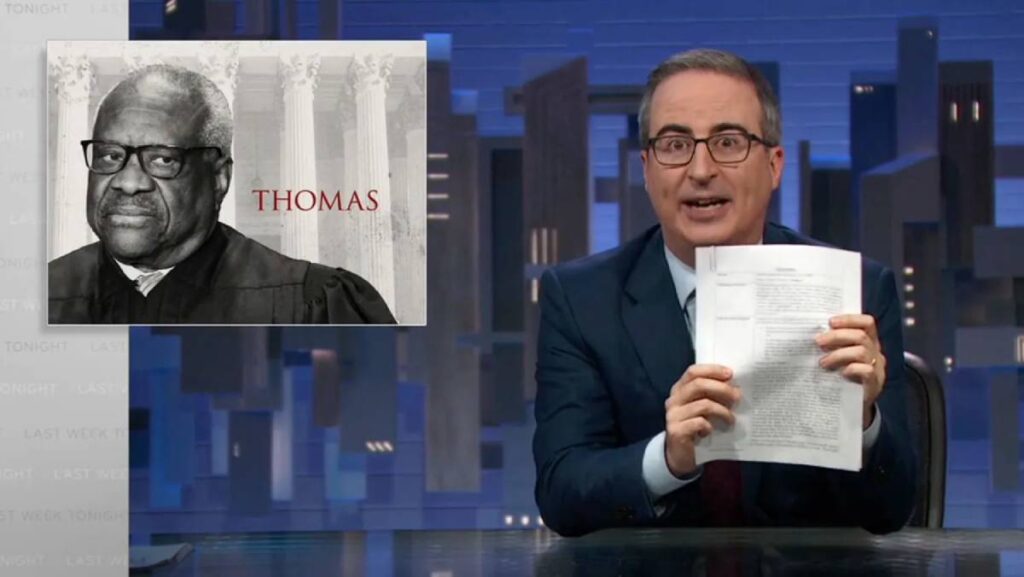Table of Contents
In a move that blurred the lines between comedy and political commentary, John Oliver, the host of HBO’s “Last Week Tonight,” made an unprecedented offer to Supreme Court Justice Clarence Thomas: resign from the Supreme Court, and in return, receive $1 million per year for life, along with a luxury motor coach. This bold proposition has ignited discussions on ethics, accountability, and the influence of money in the judiciary, capturing the nation’s attention and sparking debate across various platforms.
| Attribute | Information |
| Event | John Oliver’s $1 Million Offer to Justice Clarence Thomas |
| Date | Offer made in February 2024 |
| Primary Participant | John Oliver, host of HBO’s “Last Week Tonight” |
| Secondary Participant | Justice Clarence Thomas, U.S. Supreme Court |
| Offer Details | $1 million per year for life and a $2.4 million luxury motor coach |
| Purpose of Offer | To highlight and critique perceived ethical issues and the influence of wealth in the U.S. Supreme Court |
| Public Reaction | Mixed reactions, sparking widespread discussion on ethics, accountability, and satire in political discourse |
| Legal Implications | Raises questions about the ethical frameworks governing the judiciary, though primarily satirical |
| Cultural Impact | Highlights the role of satire in political commentary and the power of celebrities in political discourse |
| Outcome | As of now, no public response from Justice Thomas; ongoing discussion about Supreme Court ethics and reform |
The Heart of the Matter
At the core of Oliver’s audacious offer is a critique of the perceived ethical lapses within the highest court of the United States. By targeting Justice Clarence Thomas, Oliver highlights concerns over undisclosed gifts and trips from wealthy benefactors, raising questions about impartiality and integrity within the Supreme Court.

The Offer Explained
- $1 Million Per Year: A lifetime offer to Justice Thomas, aiming to spotlight the issue of accountability.
- Luxury Motor Coach: Valued at $2.4 million, adding a touch of extravagance to the proposal.
- 30-Day Deadline: A time-bound challenge, emphasizing the urgency of the ethical debate.
The Role of Satire in Political Discourse
Satire has long been a tool for critiquing and bringing attention to societal and political issues. Through humor, satirists like John Oliver are able to dissect complex topics, making them accessible and engaging to a wider audience. This section explores how satire functions as a form of political commentary, its impact on public opinion, and its ability to hold powerful figures accountable. It also examines the historical context of satire in politics, drawing parallels between Oliver’s actions and those of satirical commentators from the past.
- Historical Precedents: A look at how satire has been used throughout history to challenge the status quo and provoke thought.
- Impact on Public Opinion: Analysis of how satirical commentary can influence perceptions and spark meaningful conversations.
- Accountability Through Humor: Discussion on the power of humor to critique and call for transparency among public officials.
Ethical Considerations and the Judiciary
The ethical implications of Oliver’s offer extend beyond the immediate laughter it provokes, touching on serious concerns about the integrity of the judiciary. This section delves into the ethical standards expected of Supreme Court justices, the current mechanisms in place for ensuring accountability, and the potential need for reform. It also considers the ethical boundaries of satire itself, questioning where the line is drawn between humorous critique and potentially harmful allegations.
- Judiciary Ethics: Overview of the ethical guidelines governing the behavior of Supreme Court justices and how these standards are enforced.
- Calls for Reform: Examination of the ongoing debate over the need for enhanced transparency and stricter ethical regulations within the Supreme Court.
- Satire vs. Slander: Exploration of the ethical considerations for satirists in balancing humor with respect for the truth and the reputations of their subjects.
TL;DR: Key Points of John Oliver Bribery
- Offer Details: John Oliver proposes $1 million per year and a luxury motor coach to Justice Clarence Thomas for his resignation.
- Ethical Concerns: Highlights ongoing ethical debates surrounding the Supreme Court.
- Public Reaction: Sparks widespread discussion on justice, accountability, and the role of satire in political discourse.
- Legal and Ethical Implications: Raises questions about the influence of money and gifts on judicial impartiality.
Conclusion
John Oliver’s offer, while satirical, underscores a critical dialogue about ethics, accountability, and the influence of money in the judiciary. It serves as a reminder of the power of comedy to provoke thought, challenge institutions, and inspire debate on significant issues facing society.
People Also Ask About John Oliver Bribery Offer To Clarence Thomas
What motivated John Oliver to make this offer?
John Oliver aimed to spotlight and critique perceived ethical lapses and the influence of wealth on the Supreme Court’s integrity.
Has Justice Clarence Thomas responded to the offer?
As of now, Justice Thomas has not publicly responded to Oliver’s proposition.
Is Oliver’s offer legally binding?
While the offer is more satirical than serious, it raises legitimate questions about the ethical frameworks governing the judiciary.
What are the potential implications of this offer?
Oliver’s challenge has sparked a broader conversation on the need for transparency and ethical reforms within the Supreme Court.
Can comedy influence political or judicial outcomes?
While primarily for entertainment, satire like Oliver’s can significantly impact public discourse and awareness on critical issues.
What does this incident say about celebrity influence on politics?
It underscores the powerful platform celebrities have to highlight issues, challenge norms, and engage with political discourse in unique ways.

